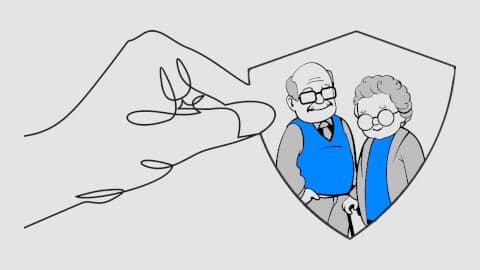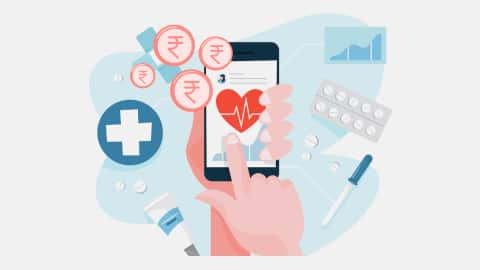1
Feeling Inadequately Insured? 3 Ways To Extend Your Health Insurance CoverBreaking Tradition
Policy on Phone Call: Policybazaar & insurers come forward to extend helping hand
Planning to get yourself insured but unsure about how pre-policy medical check-up would be possible amidst Coronavirus outbreak? Well, you need not worry because the insurance industry has extended an olive branch by doing your medical over the phone, and issue life and health insurance policies.
In these unprecedented times, when the country is under lockdown, Policybazaar.com, along with leading insurance providers, such as ICICI Prudential Life, Max Life and PNB MetLife, Religare, Max Bupa, Max Health Insurance, Star Health, HDFC Ergo, HDFC Life and Tata AIA, is making sure that medical check-ups are available to prospective customers via a phone call, also known as tele-medical. The move cuts down the risk of a physical meeting between customers and doctors for a medical, and lets insurers carry on with underwriting over the phone. For the uninitiated, during the current lockdown, insurance has been included in the list of essential services.
Telemedical is a process that replaces the need to visit a doctor or a diagnostic center with a phone call, which is arranged by the insurers, wherein questions related to existing medical conditions and illnesses are asked by a verified doctor. Industry experts say, digital platforms like Policybazaar play a lead role in insurance distribution. They play an integral role in passing on the message to the customer about the benefits that are available while buying insurance.
“When buying a health insurance cover, a medical checkup from a doctor might be required. Now, since customers are wary of stepping out, we have an option wherein a customer is not required to visit a diagnostic center. We are seeing more insurers are now coming forward and extending tele-medical facility for customers,” says Santosh Agarwal, Chief Business Officer, Life Insurance, Policybazaar.
…since customers are wary of stepping out, we have an option wherein a customer is not required to visit a diagnostic centre. We are seeing more insurers are now coming forward and extending tele-medical facility for customers
Santosh Agarwal
Chief Business Officer, Life Insurance
Currently, tele-medical facility is available for both health and term insurance policies from all the leading insurers on Policybazaar's platform. In fact, over the last few weeks there has been a significant uptake in the queries and conversion rates of insurance purchases on Policybazaar. “We have seen the conversion rate at our platform increase by around 35% over the last 3-4 weeks,” adds Agarwal.
SIGNIFICANCE OF TELE-MEDICAL
Vibha Padalkar, Managing Director & CEO, HDFC Life says, “Tele-medical reduces the number of customers who have to walk-in to a medical center for a physical examination. Therefore, in today's scenario, one can apply for a life insurance policy digitally and there is a chance that the proposal may get accepted without having to physically visit a branch and a medical center.” HDFC Life introduced tele-medicals some time back as part of their risk assessment.
Manish Dodeja, Head (Claims & Underwriting), Religare Health Insurance believes that tele-medical facility is helpful in current testing times. He says, “Tele-underwriting is a good tool to underwrite proposals. This evaluation is carried out by the insurer over a call. While this was always very convenient for the customer, its proven to be a blessing during the present COVID-19 pandemic wherein individuals are advised against venturing out of their homes.”
He adds, "an insurer’s proposal form captures fairly detailed information of the customer; this alongwith a telephonic discussion between the insurer and customer enables the former to take a decision on the coverage to be offer to the customer."
Manu Lavanya, Director, and Chief Operations Officer, Max Life Insurance says that the new age customer wants to do things on the convenience of their own time and place. “Telemedical facility provides convenience vis-a-vis going to a medical center for a test which is the first big driver for the customers in the existing scenario,” he says.
According to Lavanya, the second big driver is that it appeals to the digital persona of the modern-day customer. “Nowadays, people want to do everything digital in their life because it is faster. There is no reason that they won’t demand the same from the insurance industry,” he adds. And why not, the paradigms of how insurance would be issued in the future may undergo a significant change, by the time the coronavirus outbreak is behind us.
“Customers also feel comfortable because as compared to a visit to a diagnostic center, they want to choose the privacy of their home to answer medical questions. Especially, in the current context of Coronavirus outbreak, customers don’t want to step out,” says Lavanya. Max Life Insurance is also registering a significant spike in the number of policies being sold through tele-medical.
PHYSICAL MEDICAL CHECK-UP
a) For Health Insurance: 
When you buy a health plan you may be required to go through a medical test. A medical test is mandatory for senior citizens as their risk profile is higher (usually, people above the age of 45 or 50 years). A medical test may also be required for a person opting for a higher sum insured.
For example, a person with an annual salary of Rs 4 lakh opting for a sum insured of more than Rs 10 lakh, might need to undergo a medical test. If you are in your 30s and have a good health, no pre-existing disease, you need not undergo a medical test.
b) For Term Insurance: 
Medical tests for buying a term insurance policy depends on the profile of the customer and the risk to the insurer. “There are term plans listed on our platform for which a physical medical report is not required, depending upon the profile of the customer and risk to the insurer,” says Agarwal.
For instance, there might be no medical test required for someone in the 30-35 year age group looking to buying a term insurance of Rs 1 crore; but for a 40 years old individual, a physical medical might be required, depending on their medical history.
EVOLUTION OF TELE-UNDERWRITING
At the beginning of the decade, the risk appetite of health insurers was lower as they had an option to increase premiums of customers at the time of renewals (if they had a claims history). In 2012, the Insurance Regulatory and Development Authority of India (IRDAI) brought in reforms by abolishing the practice of loading premiums for consumers if claim settlements were existing in the previous instance.
From the insurers' perspective, under-writing became important. There were deliberations around which medical tests are required from a customer to issue a policy. Till 2012, insurers could deny renewals or increase the premium amount if a customer had a higher number of claims. The introduction of new reforms led to a focus shift on medical tests of the customers by the insurer for gatekeeping and reducing the risk.
Around 2016-17, as the market started building up and health insurance specialists started picking up the pace, the credibility of pre-policy medical checkups (PPMC) came into focus and seemed like a fairly inefficient process in terms of policy issuance to a customer. It was because a physical medical checkup is helpful in knowing the current health status of an individual but not the history of their illnesses. And, at the same time it was a costly affair for the insurers.
So, insurers wanted to look at alternatives wherein they could do an effective assessment. This was when they came up with the idea of tele-underwriting — a process in which a recorded telephone interview is used to gather risk-related information directly from the insurance applicant.
If a medical practitioner had a casual conversation with customers over the phone around their current health status, the insurer would probably able to read more about the customer’s current health situation rather than the results of PPMC.
For example, if you have diabetes, it may be possible that you are controlling yourself and your blood sugar level may not show up in the tests conducted. However, when a doctor speaks to the customer, most of them divulge honest information regarding their medical history. The advantage of this whole process was that most customers were fairly open to doctors.
Doctors could ask about the previous medical reports to the customers to know their history. Therefore, telemedical facility helped lower the cost to the insurer, resulting in better risk perception, and giving a better turnaround time to the customer, making it a win-win situation for both the customer and the insurer.
THE WAY FORWARD
“Tele-medicals are here to stay and will play a big role in the near distant future. We have a strong belief that as the consumer becomes more digital, the capability of data and analytics increases to understand insights about customers,” adds Lavanya.
Industry leaders believe with time, technology and analytics will become more relevant in designing the right questions that medical professionals need to ask to drive the right surrogate for the medical test.














